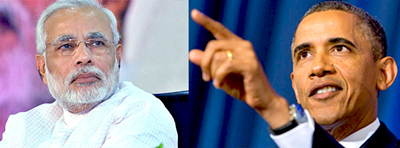New Delhi, Jun 5: In what is probably the most significant foreign policy decision taken since he became Prime Minister, Narendra Modi has confirmed to US President Barack Obama that he will have a bilateral meeting with him in Washington in the last week of September this year.
Obama had invited Modi to the US when he called up the PM to congratulate him. Significantly, the meeting won't happen on the sidelines of the United Nations general assembly in New York but in the form of a full-fledged bilateral summit in Washington.

The two sides are finalizing the date for the meeting which will be in the last week of September, it is learnt. The Modi-Obama summit promises to be one of the foremost international events of the year and will overshadow Modi's presence at UNGA, if he decides to go to New York too.
In taking the decision, Modi has shown that his own predilections, if any, won't come in the way of ties with the US.
He has, in fact, acted with alacrity and decisiveness on what many believe is going to be one of the biggest immediate challenges for India's foreign policy — that of mending India-US ties which had tapered off under UPA-2 and then nosedived with l'affaire Khobragade.
Modi's decision underlines the significance of the US in India's strategic matrix. There was speculation that Modi could focus more on China and South Korea for economic gains and on an improved security partnership with Japan but these are not likely to come at the expense of Washington.
Modi was thought to be inadequately equipped to mend India-US ties because — as some reckoned — he could find it difficult to come to terms with the US hostility towards him after the 2002 Gujarat riots, and the resultant revocation of his US visa. He remained the only person to be barred from traveling to the US for many years under the country's controversial International Religious Freedom Act.
While the UK and EU were quick off the blocks in reaching out to Modi, US was late in responding, but once it did in the form of a meeting former US ambassador Nancy Powell sought with him, Modi has been generous in his response.
In an interview , before he took over as PM, Modi had said that relations between the two countries cannot be allowed to be "even remotely" influenced by incidents related to individuals.
Describing the US as a natural ally, he said it was in the interest of both countries to further develop the relationship.
Modi's decision to confirm the Obama bilateral is also the second big surprise he has sprung on his detractors who thought he would be straightjacketed by his own election campaign, and the baggage he was supposed to have come with on relations with the US.
Despite Pakistan featuring in his speeches, and his admonition of UPA for its 'biryani' diplomacy, Modi successfully invited Pakistan PM Nawaz Sharif for his swearing in.





Comments
Add new comment